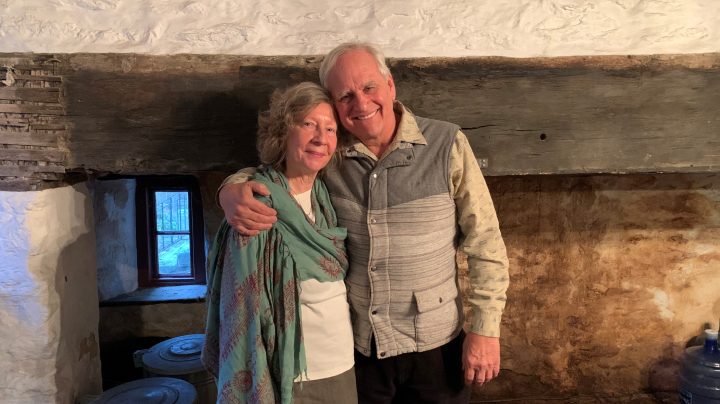
Adventures in Housing: The Caretaker
Adventures in Housing: The Caretaker

In the middle of a wooded city park in Philadelphia, at the bottom of a winding road, there’s an old stone house by a creek. And if you ask nicely, Craig Johnson will probably show you around. He’s used to people knocking on the door.
“Or we’ll leave the door open, and they just walk right in,” he said. “It happens regularly.”
Such is the life of a caretaker of a historic house — in this case a house called Glen Fern. In 1747 a Quaker named Thomas Livezey bought the house to set up shop as a miller, and he prospered.
“It went from two bedrooms, to four bedrooms, to eight bedrooms,” Johnson said. There was a large barn on the property, and vineyards. Livezey sent some of his wine to Benjamin Franklin in Paris during the Revolutionary War, Johnson said, “to show that colonials were civilized enough to make their own wine.”

In the mid-1800s, the city of Philadelphia started buying up land along its rivers and creeks, including Thomas Livezey’s estate, to protect the water supply. That land became one of the biggest urban parks in the country, Fairmount Park, with dozens of historic houses.
“We see these homes as really valuable assets for the citizens of Philadelphia, and we want to protect them,” said Lucy Strackhouse, who manages the Fairmount Park Conservancy’s caretaker program. “One of the best ways to do that is to have people living in them.”

But Glen Fern needed more than a caretaker. It needed a benefactor who could put up more than $150,000 to restore the house, on top of paying a monthly rent. Ten years ago Johnson was looking for a new space for his business designing nature center exhibits. When he found out about Glen Fern, he immediately drove down into the park to take a look.
“I’m in the middle of woods, in the middle of the city, next to a creek,” he remembered. “I went, ‘this looks really good.’”
It also looked really bad. The dining room floor had disintegrated into the dirt, and parts of the ceiling were falling down. The jumble of electrical wiring from different eras needed to be completely redone. It cost thousands of dollars just to do a historical analysis of the 17 coats of peeling paint.
“As you move throughout the house, the colors are very close to the original paint colors that were here 250 years ago,” he said.
Apparently, mustard was big back then.

Living in such an old house has been its own adventure. Johnson hired a medium to exorcise the seven ghosts he said were trapped in the basement, soldiers from the Revolutionary War. The septic tank has to be cleaned out every three weeks for $200 a pop. He’s hung heavy drapes across the doorways between rooms to keep the drafts down, and installed more than a dozen space heaters.
“That was probably the biggest issue — the cold in the winter, for me,” said Carol Adams, Glen Fern’s newest resident. “I had to buy a whole new wardrobe.”
Adams, 68, is a retired teacher who met Johnson four years ago.
“On my third date with Craig, he was going to make me dinner, so I drove down and down and down,” she said. “I fell in love with him and the land.”
Adams shares Johnson’s love of nature. Along with the deer and foxes and birds that frequent the area, they’ve seen the occasional bear.
“My favorite adventure is our experience, our relationship with the snakes,” she said, referring to the resident northern water snakes they’ve named Ophidia and Serpentina.

Nine years into a 15-year lease, Johnson said “the juice may not be worth the squeeze,” financially. For all the money and time he’s put in, he’s not building any equity. But, at 73, that’s not his priority. As long as he and Adams can manage the narrow stairs, they plan to continue their love affair with Glen Fern.
“Whatever investment I do here, it’s basically for the people of Philadelphia,” he said. “At this stage of my life and my career, that really seemed like the right thing to do.”
Tell us about your adventure in housing below, and we might just put you on the radio.
There’s a lot happening in the world. Through it all, Marketplace is here for you.
You rely on Marketplace to break down the world’s events and tell you how it affects you in a fact-based, approachable way. We rely on your financial support to keep making that possible.
Your donation today powers the independent journalism that you rely on. For just $5/month, you can help sustain Marketplace so we can keep reporting on the things that matter to you.












